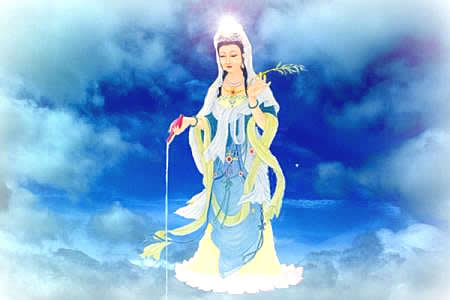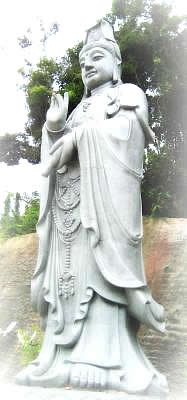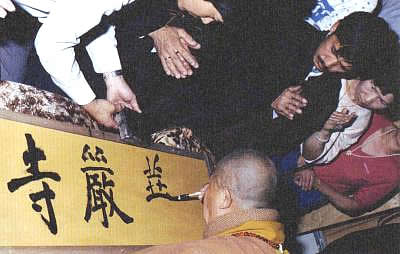 |
|
Responses from Reciting
Namo Guan Shi Yin Pusa
A talk given by Shramanerika Jin Lian on October 25, 2011
Buddhas, Bodhisattvas, Venerable Master, Dharma Masters and all good knowing advisors, Amitabha. Tonight is Shramanerika Qin-Jie Jin Lian’s turn to tie Dharma affinities with the assembly. During my talk, if there is anything that does not accord with the Dharma, please kindly correct me. I know these days everyone is busy and worn out. So tonight, I would like to share a story with all of you -- a true story.
Born into a big family with many siblings in Vietnam, he was the youngest one. His parents died when he was very little, so he only knew their names without any other impression. Though his eldest brother tried his best to take care of the whole big family financially and mentally, they were still extremely poor, so sometimes there was not even food to eat for several days. Without any opportunity to get an education of any kind, he would do anything, no matter what, just in order to survive. In his own words: “I was an extremely bad boy at that time; everyone in my village was afraid of me.”
When he was 16 years old, the war started. He was recruited. One night just before the day they left the village, two women requested to visit him. He felt very strange when he saw these two women. He was sure that he did not know them, so there must be a mistake. But just when he wanted to turn back and leave, one of the women called his mother’s name. Frozen there, he took a good look at them--two old women, one of whom was clothes were very strange, he had never seen before; the other who knew his mother’s name looked quite common. The woman cried and told him that she was one of his deceased mother’s good friends. During these years, due to her own poor situation, she regretted that she could not help them a bit. So now knowing that her best friend’s youngest son was going to the front line and probably would die in battles, she could not stand by the side any longer. She really wanted to help, so she invited one Bhikshuni to speak Dharma to him.
He was totally confused by these two women. As a young man, he felt quite irritated when he heard that he would probably die in battles; however he was not supposed to beat them in public as he wished. So he decided to be obedient and make them leave as soon as possible. He did not pay any attention to the Bhikshuni’s talk. He remembered only that at the end, the Bhikshuni insisted him to recite “Na Mo Guan Shi Yin Pu Sa” whenever he needed help.
"Na Mo Guan Shi Yin Pu Sa"--seven words, not a big deal. Normally, he would never accept any kind of suggestion, however, in order to make them leave quickly, he agreed to recite the seven words whenever he needed help. Those two women were delighted and left.
Several decades later, when he recalled this, he still felt very strange. “How come, in a new recruit’s camp, two women came to visit a bad boy, and one was a Bhikshuni?” That was the first time he saw a left-home person. How come he would promise them to recite "Na Mo Guan Shi Yin Pu Sa"? That is unbelievable to him. But the strangest thing is the seven words really changed his life. Decades after that when he really wanted to thank those two women and sincerely listen to the Dharma, spending lots of energies and money to locate them, he could not find them at all. He only knew that one died while fleeing from Vietnam, and that the Bhikshuni had totally disappeared. The cause and condition is really beyond our control.
He became a paratrooper. Without being well-trained, he and his colleagues performed their first task. Everyone was trembling when the door of the plane cabin opened. When he stood at the edge of the door, looking outside the vast empty space, he felt as if he was committing suicide. In grave despair, he wanted to try the words given by the nun “Na Mo Guan Shi Yin Pu Sa”, closing his eyes and reciting the seven words; then he was kicked out of the cabin. A big gale blew him off the destination point. Fortunately, he landed safely. But most of his colleagues died in that mission because of that gale: some were blown into the ocean and drowned; some were blown into their enemies’ land and were shot immediately; some failed in landing. For a long time, he attributed his survival to luck. Not until he studied the Buddha Dharma that he realized it was not luck at all, but the response from GuanYin Bodhisattva, but he was too stupid to learn that at that time.
Thanks for that landing, he got a chance to escape. But just when he arrived at his home, he was caught by the army. The punishment for a runaway soldier was severe. He was sent to the battle immediately. And this time he knew he would be finished if he did not escape quickly. On the way to the battle, he got a very important piece of information that there was a driver who could help people sneak away. Paid enough bribe, the driver showed him the way: at the bottom of the cargo truck between two big fuel tanks hung a piece of narrow wooden board. The driver told him to hide there that night when everyone was sleeping. The cargo car or truck would leave the next morning at 2 o’clock; no one at that time would be alert. However, if it failed, he would be killed on the spot. He agreed.
Everything went smoothly that night until he successfully sneaked out of his dorm to the cargo truck. Someone behind him slapped his shoulder, and he was too scared to scream. It turned out to be the man who shared the same room with him. That guy knelt down and pleaded to join him, otherwise, he would yell out and then no one could go. Having no choice, he had to pay a double fee for this “mission impossible.” Lying back to back on that narrow piece of wooden board, the two had to squeeze their backs tightly to keep the balance of the board. The huge tires were right behind them; once they fell both of them would be jammed.
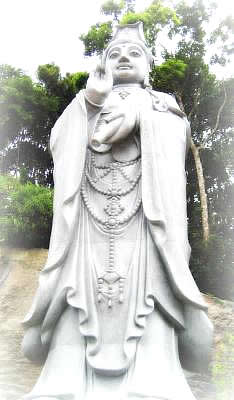
That was a tremendous torment; even today, when he recalled this experience, you can see the great suffering still in his eyes. Reciting “Na Mo Guan Shi Yin Pu Sa” was the only way for him to forget the unbearable noises, the suffocating dusts and the life-threatening stress. He felt the other man was also humming something, but that sound was too soft for him to hear. He was so curious that he listened to that humming for a long time to figure out that the man was reciting “Na Mo A Mi Tuo Fo”. Though he did not know what that meant, he was happy to notice that the first two characters were the same as his recitation. Finally, they arrived in a big city. It took almost a whole day long for them to finish the journey.
Many years after that, when he wanted to find that guy and help him to immigrate to Canada, he was told that man committed suicide shortly after his returning home. Tortured by that great suffering in that fleeing, he could not liberate himself mentally; finally he shot himself to set him free physically. Eventually, Amitabha Buddha could not save him, or was it he who refused to be saved by Amitabha Buddha? Is personality the result of fate or is fixed karma unchangeable? That is a huge topic, too big to discuss thoroughly here.
He wanted to go home to meet his eldest brother to ask him to help him leave Vietnam as soon as possible. But bad luck once again said “Hello” to him. He was caught on the way home. Caught the first time as a runaway soldier, he was sent to the battle immediately. If caught the second time as a wandering soldier, he would be shot on the spot. However, he was really lucky; the officer did not recognize him. When the officer asked his name, he replied with another name of a villager whom he remembered. So when he saw that real person was also in that camp, he almost fainted. Every time when the officer was checking the name list, he would recite “Na Mo Guan Shi Yin Pu Sa” in his heart crazily. With the same names, same addresses, same parents’ names, these two different people lived in the same camp for 6 months, and no one was aware of the unusual coincidence. Was that luck again? At that time, he himself was also wondering why he had so much luck.
Of course as the darling of the Bodhisattva, he got a chance and ran away again. He successfully went back home and met his eldest brother, who helped him flee to Canada. And in Canada, many other amazing things happened to make him believe in the Buddha Dharma and to become a very dedicated Buddhist. He put all his life to propagate the Dharma and founded his own Buddhist temple, and later on he encountered Venerable Master Hua. Deeply moved by Venerable Master’s virtuous practice, he donated his temple to DRBA. And even in his old age, he still helped a lot to construct the Avatamsaka Monastery in Calgary, Canada.
Actually, I am the one who is lucky to have had an opportunity to work with him for almost three months in Calgary. But it was not until I moved to CTTB and once I happened to open a book in memory of the Venerable Master Hua that I knew he was such a special person. I saw this picture of a middle-aged man looking like a Daoist (much like an actor capable of killing ghosts), who was leading Venerable Master to visit the Avatamsaka Monastery.

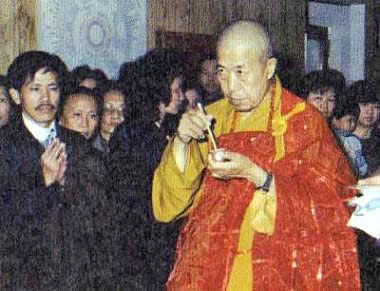
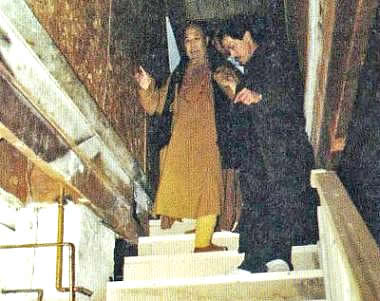
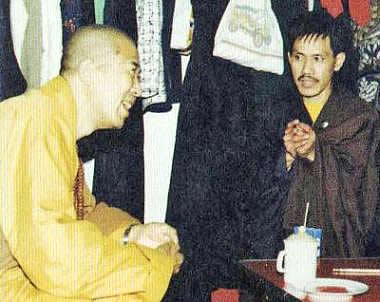
I was shocked to find out that man was him, the same person but for whom I had a totally different feeling. I could barely connect the man in the picture with the man I met. Yes, he was much older. The thing that surprised me was not his aging, but the energy that seems to radiate from him. Even from that picture you could feel his tyrannical personality. But the person I met in Calgary was a very nice but a little bit stubborn old man. Many years of reciting Guan Yin Bodhisattva’s name really transformed him. The lines on his face totally softened. His eyes are now full of compassion and kindness. I believe that is the great work of Guan Yin Bodhisattva. She successfully transformed a bad boy to a good guy. I know that from the depth of my heart.

